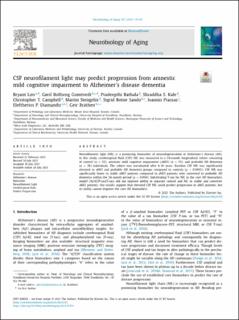CSF neurofilament light may predict progression from amnestic mild cognitive impairment to Alzheimer's disease dementia
Lim, Bryant; Grøntvedt, Gøril Rolfseng; Bathala, Pradeepthi; Kale, Shraddha S.; Campbell, Christopher T.; Stengelin, Martin; Sando, Sigrid Botne; Prassas, Ioannis; Diamandis, Eleftherios P.; Bråthen, Geir
Peer reviewed, Journal article
Published version

Åpne
Permanent lenke
https://hdl.handle.net/11250/2778482Utgivelsesdato
2021Metadata
Vis full innførselSamlinger
Sammendrag
Neurofilament light (NfL) is a promising biomarker of neurodegeneration in Alzheimer's disease (AD). In this study, cerebrospinal fluid (CSF) NfL was measured in a 24-month longitudinal cohort consisting of control (n = 52), amnestic mild cognitive impairment (aMCI) (n = 55), and probable AD dementia (n = 28) individuals. The cohort was reevaluated after 6-10 years. Baseline CSF NfL was significantly elevated in aMCI and probable AD dementia groups compared to controls (p < 0.0001). CSF NfL was significantly lower in stable aMCI patients compared to aMCI patients who converted to probable AD dementia within the 24-month period (p = 0.004). Substituting T-tau for NfL in the core AD biomarkers model (Aβ42/P-tau/T-tau) did not improve ability to separate control and AD, or stable and converter aMCI patients. Our results support that elevated CSF NfL could predict progression in aMCI patients, but its utility cannot improve the core AD biomarkers.
